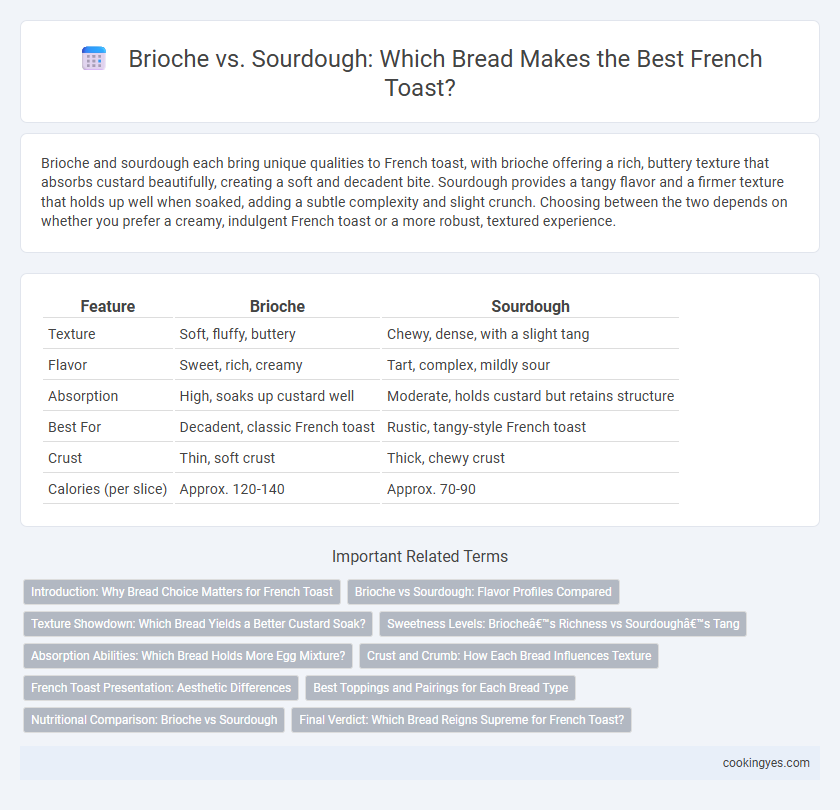Brioche and sourdough each bring unique qualities to French toast, with brioche offering a rich, buttery texture that absorbs custard beautifully, creating a soft and decadent bite. Sourdough provides a tangy flavor and a firmer texture that holds up well when soaked, adding a subtle complexity and slight crunch. Choosing between the two depends on whether you prefer a creamy, indulgent French toast or a more robust, textured experience.
Table of Comparison
| Feature | Brioche | Sourdough |
|---|---|---|
| Texture | Soft, fluffy, buttery | Chewy, dense, with a slight tang |
| Flavor | Sweet, rich, creamy | Tart, complex, mildly sour |
| Absorption | High, soaks up custard well | Moderate, holds custard but retains structure |
| Best For | Decadent, classic French toast | Rustic, tangy-style French toast |
| Crust | Thin, soft crust | Thick, chewy crust |
| Calories (per slice) | Approx. 120-140 | Approx. 70-90 |
Introduction: Why Bread Choice Matters for French Toast
Choosing the right bread is crucial for French toast because it impacts texture, flavor, and absorption of the egg mixture. Brioche offers a rich, buttery profile and soft crumb that soaks up custard while maintaining a tender bite. Sourdough provides a tangy contrast with a sturdy crust that holds the custard well, creating a balanced flavor and firm texture.
Brioche vs Sourdough: Flavor Profiles Compared
Brioche offers a rich, buttery flavor with a tender crumb that soaks up eggs and milk, creating a creamy and sweet French toast experience. Sourdough provides a tangy, slightly sour taste with a chewy texture that balances the custard's sweetness, adding depth to each bite. Choosing between brioche and sourdough depends on whether you prefer a sweet, soft profile or a complex, tangy flavor in your French toast.
Texture Showdown: Which Bread Yields a Better Custard Soak?
Brioche offers a rich, buttery texture that soaks up custard beautifully, creating a creamy and tender French toast. Sourdough, with its tangy flavor and sturdy crumb, provides a firmer bite and holds the custard well without becoming soggy. For a custard soak that balances softness and structure, brioche excels, while sourdough appeals to those who prefer a chewier, more textured result.
Sweetness Levels: Brioche’s Richness vs Sourdough’s Tang
Brioche's rich, buttery sweetness enhances French toast with a smooth, decadent flavor profile perfect for those who prefer a sweeter breakfast. Sourdough's natural tang offers a balanced contrast, creating a more complex and slightly savory taste that cuts through the richness of typical toppings like syrup or fruit. Choosing between brioche and sourdough allows customization of French toast sweetness levels, catering to both indulgent and tangy palates.
Absorption Abilities: Which Bread Holds More Egg Mixture?
Brioche's high butter and egg content creates a tender crumb that absorbs more egg mixture, resulting in a rich and custardy French toast. Sourdough's denser texture and tangy flavor absorb less liquid, producing a firmer toast with a slight tang. For maximum absorption and a softer interior, brioche is the preferred choice over sourdough in French toast recipes.
Crust and Crumb: How Each Bread Influences Texture
Brioche's tender crumb and rich, buttery crust create a soft, custardy interior with a slightly crisp outer layer, ideal for French toast that soaks up custard evenly. Sourdough features a denser crumb and a thicker, chewier crust, resulting in a French toast with more texture contrast and a pleasantly tangy bite. The choice between brioche and sourdough directly affects the balance between moistness and crunch, shaping the overall eating experience.
French Toast Presentation: Aesthetic Differences
Brioche French toast offers a rich, golden-brown crust and a tender, buttery crumb that enhances its visual appeal with a glossy finish and soft, pillowy texture. Sourdough French toast presents a rustic, artisanal look featuring a thick, crispy crust and an open crumb structure with pronounced air pockets, adding a textured contrast on the plate. The vibrant color contrast of sourdough's crust against its pale interior creates a visually dynamic presentation compared to brioche's uniform golden hue.
Best Toppings and Pairings for Each Bread Type
Brioche French toast pairs exceptionally well with rich toppings like fresh berries, whipped cream, and maple syrup, enhancing its buttery, tender texture. Sourdough French toast benefits from tangy and savory pairings such as mascarpone cheese, honey, and roasted nuts, which complement its robust, slightly sour flavor profile. Both breads shine with warm spices like cinnamon and nutmeg, adding depth to the overall tasting experience.
Nutritional Comparison: Brioche vs Sourdough
Brioche contains higher calories and fat due to its rich butter and egg content, offering a more decadent texture ideal for indulgent French toast. Sourdough provides a lower calorie option with a tangy flavor and benefits from natural fermentation, which enhances digestibility and nutrient absorption. Choosing sourdough supports a gut-friendly option with moderate carbohydrates, while brioche delivers a richer, more energy-dense choice for French toast lovers.
Final Verdict: Which Bread Reigns Supreme for French Toast?
Brioche offers a rich, buttery texture that absorbs the egg custard perfectly, creating a tender and indulgent French toast experience, while sourdough provides a tangy flavor and firm structure that holds up well to soaking without becoming soggy. For ultimate richness and consistency, brioche is preferred in classic French toast recipes, but sourdough appeals to those seeking a balance of flavor and texture with a slight crunch. The final verdict favors brioche for its superior ability to produce a creamy, melt-in-the-mouth French toast that embodies traditional decadence.
Brioche vs Sourdough for French Toast Infographic

 cookingyes.com
cookingyes.com